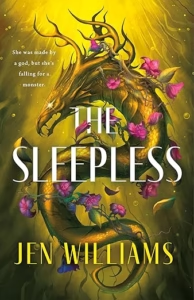The Sleepless
Jen Williams
Wednesday Books
Published September 30, 2025
Amazon | Bookshop | Goodreads
About The Sleepless
Godkiller meets Powerless in this epic gods-and-monsters romantic fantasy from British Fantasy Award-winning author Jen Williams.
Welcome to a world where gods and monsters roam the earth . . .
Elver is the guardian of the wild and dangerous monster forest. Saved from the brink of death by a god, her skin will poison anyone she touches.
Artair is on a mission—one that takes him face-to-face with Elver at her most ruthless. But her defenses are useless when she discovers he’s the only human impervious to her deadly gift. For Artair isn’t human: he’s one of the Sleepless, cursed to share his body with an evil spirit.
Lucian inhabits their body while Artair sleeps, and he is hell-bent on manipulating Elver for his dark purposes. But Elver is harbouring secrets too, and she has her own reasons for feigning an alliance with these two souls.
Caught in the crossfire of gods, monsters, and a dangerous magic they can barely understand, it is only a matter of time before the paths the three of them choose to take will set alight the very foundations of their world.
With a love triangle like you’ve never seen it, incredible world-building, brilliant writing, and a dangerous quest, The Sleepless will have you spellbound.
My Review
Yeah, I have to give the cover copy credit; this book definitely had me spellbound by the end. The story world is so different. In some ways, there’s so much worldbuilding that I felt really immersed in the pantheon of gods and their history with each other. Both main characters are deeply devoted to their way of life. They come from very different backgrounds, but they find some critical common ground. Both are incredibly isolated, and they’ve each assumed their lives must be that way. Their experiences make it impossible for them to return to those isolated, closed lives, though. I loved that for them, and I love that as part of their character growth.
Lucian is also a really interesting character. I flip-flopped back and forth on how I felt about him multiple times. Is he misunderstood? Evil? Has he changed because of Elver’s kindness? What happens if he recovers his memories and remembers who he was?
There’s also a very slow-burning romance/love triangle in the story. I wasn’t sure how I’d feel about it, but actually, I think the author pulls the romance together nicely.
This is the first part of a duology, and the ending shows that. There’s a partial resolution, but it’s clear that the characters have more still to do before they can be truly free.
The Sleepless is the first novel by Jen Williams that I’ve read, and I definitely want to read more. Currently, the conclusion to the duology is scheduled for publication in May 2026. I’ve already got it on my list to read next year!
Content Notes
Recommended for Ages 14 up.
Profanity/Crude Language Content
Strong profanity used a few times.
Romance/Sexual Content
Kissing. Brief, very vague reference to sex.
Spiritual Content
The story world contains a pantheon of gods, each of whom have different abilities, temples, and followers. One god demands blood sacrifices in exchange for power or attention. Another god uses light to burn away the presence of magic from other gods, which sometimes causes death.
Violent Content
Situations of peril. A group of people throw a child over a cliff into the sea to appease a god. (She does not die.) Some characters do not sleep. Instead, when they go unconscious, another person “wakes up” inside them and that alternate person is sometimes violent. These Sleepless are imprisoned in a monastery where their others cannot hurt anyone. One character intends to sacrifice others to their god in exchange for power. One character’s touch is toxic to humans. She uses this to incapacitate or hurt those who wish to harm her or her allies. Brief battles between characters occur. References to the death of children as a result of a conflict between gods.
Drug Content
Characters drink alcohol at one point. It’s unclear whether they knew the drinks were alcoholic. They received them while hiding from pursuers.
Note: This post contains affiliate links, which do not cost you anything to use but help support this blog. I received a free copy of this book in exchange for my honest review. All opinions are my own.
